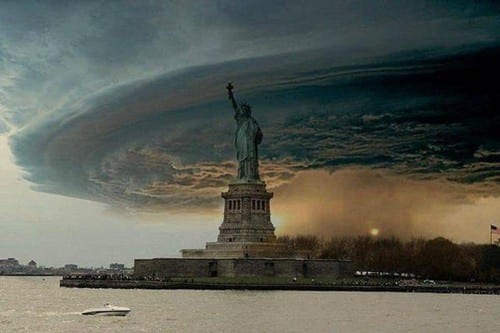When Hurricane Sandy slammed New York with its immense force and speed last week, I was ready. I stocked up on water, food, flashlights – and stayed home.
For the first time in my life in New York, I was responding to the hurricane not as a journalist on assignment, but as an ordinary New Yorker seeking safety and offering help to those in need.
I was checking on my next-door elderly neighbor – an 87 year-old widow.
I was calling and emailing friends in lower Manhattan that is infamously dubbed as Zone A (flood-prone area).
And in the days and hours of Sandy’s worst behavior blowing up Con Ed station downtown, flooding tunnels and subway stations, swallowing homes and torching neighborhoods, I was glued to updates on YouTube, Facebook, and my TV set while hunkering down in my apartment and staring at the raging Hudson River.
While following the torrent of information about Sandy’s path of destruction on Twitter and Facebook, I got a call from a school friend who was in my Japanese class in graduate school – Katya. In her shaky voice calling from upstate New York, she told me her home, just below the street level East Village was wiped out. I told her not to worry – I’d help her clean up.
The next day, another friend in West Village called back and recounted his dramatic dash from the surging Hudson towards his home. He was fine, but parts of his basement were inundated. He sounded distraught, I listened with all ears, and told him I’d swing by to visit.
Last but not least, the grandma of my 13-year old goddaughter who lives alone in the top floor of a low-rise in Chinatown – had not answered her phone for days. Grandma had previously complained of bad knees and lower back problems – I fear she was stranded without food, water or heat. I decided to go find her in Chinatown.
I spent all afternoon Saturday knocking on doors in her building on Monroe Street, talking to her neighbors holding a flashlight in the dark. Nobody knew where she was, but everyone guessed she’d left for her son’s place. These strangers I’d just met in this long, dark and dingy staircase became instant neighbors, chatting like old friends and asking me about my home and my family – all because of the storm.
Little did I know – these newfound neighbors soon spread and share the story of my visit. Later that evening, I heard from grandma! In a quintessentially Chinese manner, she apologized profusely on the phone for making me worried. I told her to stop apologizing, and that we should meet for tea the next day. We ended up spending Sunday afternoon eating dim sum in Chinatown – talking about her life, her bold move from China to the United States more than fifteen years ago, her struggle to learn English, and her decision to vote for Obama – her first vote as a U.S. citizen.
“I’m an old lady from the peasant class, and you’re a young woman from the educated class, and you’re talking to me like we’re old friends, I’m very touched. “ Grandma said, and repeated this numerous times throughout our meal.
“You’re a person, grandma. We are all part of humanity. We can all come together regardless of age, or class. You have been through a lot, I’m happy to be here with you.”
“I used to feel sorry for myself when I lost my daughter to breast cancer, and I almost lost my will to live later when I developed breast cancer myself.” She spoke in rapid-fire Fujianese-tinted Cantonese.
“Now, I feel so surrounded by love – from everyone – from you, my family, my community, and from this country, I want to live and be strong!” Grandma started raising her voice with gusto, her face beaming with a mile-wide smile.
Grandma’s story was such a heartwarming finale to cap my Sunday on a high note. While heading home on a bus, I recalled my time with Katya earlier in the day when I was helping her clean up her furniture ruined by flood water mixed with sewage. We were initially disgusted with the damage; but once we got down to work sorting out what to trash and what to keep, we started bonding in a new way. We talked about our families. She began recalling stories about her Russian father, Italian-Flemish mother, her move from Canada to the U.S. while sifting through the mountain of momentos – photos of her dad, mom, uncle, her childhood; love letters and handwritten cards from her faraway family. She cracked a smile, her mood turned cheery. As she was gazing at this pile of “buried somewhere,” “almost-forgotten” trove of memories – all tokens of love, I thought to myself all this – was also because of the storm.
Yes, this was a devastating deadly storm – it’s torn apart lives and homes. But this is also a storm that binds people, and leads us to re-discover love and strength in relationships we may not have thought possible.
当飓风桑迪带着它强大的风力和风速席卷纽约时,我准备好了。我备好了水、食物和手电,呆在家里。
这是我生命中第一次不以有任务在身的记者身份迎接飓风,而是作为一个有安全需求的普通纽约人,为那些需要的人提供帮助。
我看望了我年长的邻居,一个87岁的寡妇。
我给住在曼哈顿下城的朋友们打了电话,发了邮件,那是一个被无情地授予A区(易受洪灾区)称号的地方。
在桑迪尽情肆虐的时间里,它吹散了下城的Con Ed大楼,淹没了地道和地铁站,吞没了家园,燃烧了社区。我盘坐在家,盯着上涨的Hudson河水的同时,时刻关注着YouTube、Facebook和电视上的最新消息。
我接到了在学校里认识的朋友,我研究生学院日语课上同学Katya的电话。她从纽约上州打来,用颤抖的声音告诉我,她在East Village街道水平面以下的家被水淹没了。我告诉她不用担心,我会帮她清理。
第二天,另一个住在West Village的朋友打电话重述了汹涌的Hudson河水如何猛烈冲击他的家。他还好,但是他家地下室的部分地方被水淹没了。他听起来很心神不宁,我专注地听着,然后告诉他我会看望他。
然后但不是最后,我13岁教女的奶奶独自住在中国城一个矮楼的上层,她好几天都没有接电话。奶奶之前抱怨过她有膝盖和背部的问题。我担心她处于没有食物、水或暖气的困境。我决定去中国城找她。
我用了星期六的整个下午在Monroe街上她住的那个楼里敲门,握着手电筒,在黑暗中跟她的邻居们打听情况。没人知道她在哪儿,大家都猜她去了她儿子那里。这些我刚刚在这个又长又黑又脏的楼梯间认识的陌生人一瞬间成了邻居,他们像老朋友一样跟我聊天,问我家庭和家人的情况,都是因为这场飓风。
当时我并不知道,这些新的邻居们很快宣扬了、分享了我来探访的事情。那天的傍晚,我联系上了奶奶。用非常典型的中国方式,她在电话里不停地道歉,因为让我担心了。我告诉她不用道歉,我们第二天应该见面喝茶。我们星期日下午在中国城吃了茶点。我们聊到她的生活,15多年前,她勇敢地从中国搬家来到美国,很困难地学英语,她决定投票给奥巴马,这是她作为美国公民的第一次投票。
“我是一个农民阶级的老太太,你是一个受过教育的年轻女子,但你跟我像老朋友一样聊天,我很感动。”奶奶说,并在我们吃饭的过程中不断重复很多次。
“你是一个人,奶奶。我们都是人道主义的一部分。不论年龄和阶级,我们可以在一起。你经历了这么多,我很高兴能在这里陪你。”
“我以前以为我很不幸,我女儿死于乳腺癌,之后当我自己也得了乳腺癌的时候,我几乎失去了活下去的勇气。”她用快速的有福建口音的广东话说。
“现在,我觉得我被爱环绕着,来自所有人,你、我的家人、我的社区、这个国家,我想要坚强地活下去!”奶奶的声音开始提高,充满热情,她脸上洋溢着温和的笑容。
奶奶的故事像一个温暖人心的结束曲,带我的星期天进入高潮。在坐公交车回家的路上,我回忆起那天的早些时候与Katya在一起,我帮她收拾被水淹过、混杂着污物的家具。一开始,我们觉得这些损失很恶心,但当我们弄清楚什么该丢弃,什么该留下以后,我们开始以新的方式联系在一起。我们聊到了我们的家庭。在筛选她堆积如山的纪念品时(她爸爸、妈妈、叔叔和童年的照片,从遥远家乡寄来的充满爱意的信和卡片),她开始回忆起她的俄罗斯爸爸、意大利和佛兰德混血的妈妈,她从加拿大搬家到美国。她笑了,态度也轻松起来。她盯着这一堆“躲藏在某处”、“几乎被遗忘”的发掘出来的记忆,这都是爱的象征,我这样告诉自己,这都是因为这场风暴。
是的,这是一场严重的悲惨的风暴,吞噬了生命和家园。但这也是一场把人们连结在一起的风暴,同时也让我们重新发现了之前也许认为人情中不可能有的爱和力量。


